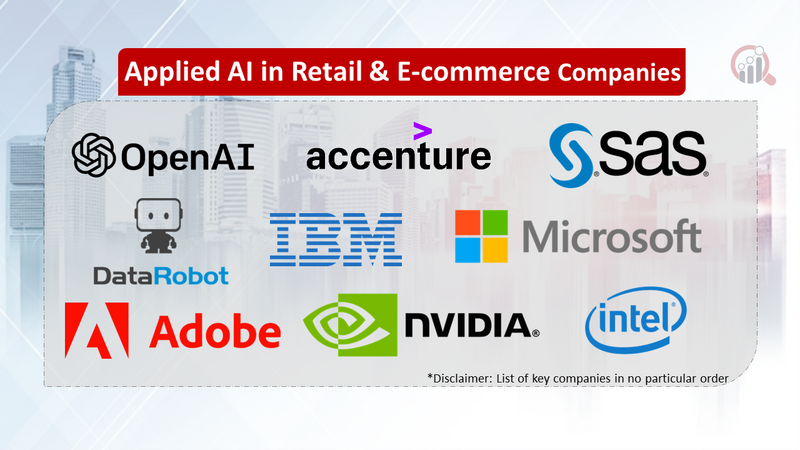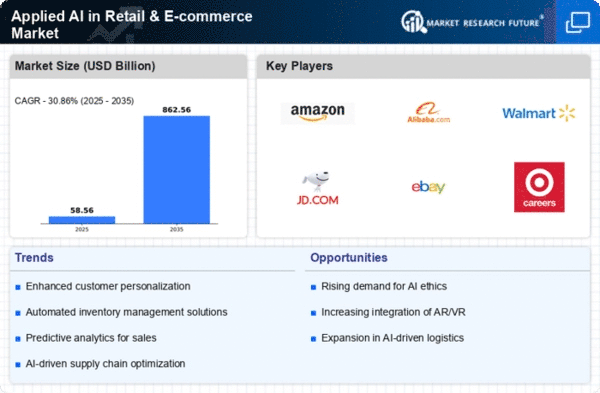Top Industry Leaders in the Applied AI in Retail & E-commerce Market

Competitive Landscape of Applied AI in Retail & E-commerce:
The retail and e-commerce landscape is undergoing a profound transformation driven by the integration of Applied Artificial Intelligence (AI). From personalized recommendations to optimized supply chains, AI solutions are redefining customer experiences, operational efficiency, and market competitiveness. This dynamic ecosystem thrives on a diverse range of players, each employing unique strategies to capture market share.
Key Players:
Strategies for Market Share:
- Technological Innovation: Leading players constantly seek to advance their AI capabilities, developing cutting-edge algorithms and integrating the latest advancements in machine learning, natural language processing, and computer vision. This focus on staying at the forefront of technological progress helps attract and retain clients.
- Customization and Integration: Offering customized solutions tailored to specific retail needs and seamlessly integrating with existing systems is crucial for success. Players like Criteo and Bloomreach excel in this regard, providing adaptable AI solutions that seamlessly plug into existing retail infrastructure.
- Data-Driven Insights: The ability to derive meaningful insights from vast customer data sets is another key differentiator. Companies like Amazon and Google leverage their proprietary data lakes and advanced analytics tools to offer retailers actionable insights on consumer behavior, market trends, and operational efficiency.
- Partnerships and Collaborations: Strategic partnerships with e-commerce platforms, system integrators, and data providers broaden market reach and enhance solution offerings. For example, Microsoft's partnership with Shopify expands its access to small and medium-sized businesses in the e-commerce space.
Factors for Market Share Analysis:
- Solution Breadth and Depth: The comprehensiveness of the AI platform or solution offered, encompassing various applications across the retail value chain, plays a significant role in market share.
- Client Base and Target Market: Focusing on specific segments like large retailers, e-commerce platforms, or niche verticals can lead to market dominance within that segment.
- Pricing and Commercial Strategies: Balancing competitive pricing with feature-rich offerings and value-added services is crucial for attracting and retaining clients.
- Innovation and Technological Advancement: The ability to consistently innovate and stay ahead of the curve in terms of AI capabilities is essential for long-term market leadership.
New and Emerging Companies:
The Applied AI in Retail & E-commerce market is constantly evolving, with new players emerging to address specific needs or offer innovative solutions. Companies like Syte.ai, focusing on AI-powered visual search, and Caper, which leverages robotics for in-store automation, are examples of disruptive startups carving out their niche.
Current Company Investment Trends:
There is a significant increase in investments from retailers and e-commerce platforms in AI solutions. These investments are primarily focused on areas like:
- Personalization and Customer Experience: Enhancing product recommendations, targeted marketing campaigns, and interactive shopping experiences to drive customer engagement and loyalty.
- Operational Efficiency: Optimizing supply chains, automating tasks, and improving inventory management to reduce costs and increase profitability.
- Data Analytics and Insights: Deriving actionable insights from customer data and market trends to inform strategic decision-making and product development.
Latest Company Updates:
Jan 12, 2024, Amazon launches "StyleSnap" powered by AI, allowing users to find similar clothing items based on pictures.
Jan 10, 2024, Sephora partners with ModiFace to offer virtual makeup try-on experiences in stores and online.
Jan 5, 2024, Nike integrates AI-driven size and fit recommendations into its e-commerce platform.











